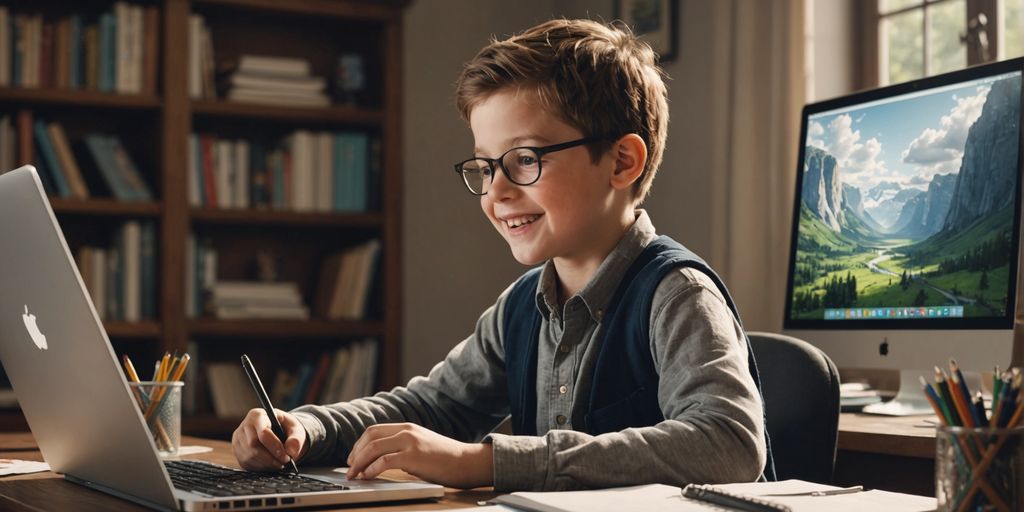In today’s world, computers are becoming more and more important in primary education. From doing schoolwork to playing educational games, having a computer can help your child in many ways. This article will explain why getting your child their own computer for school is a good idea.
Key Takeaways
- Computers are widely used in primary schools, helping students with their lessons and projects.
- Having a computer can help your child learn important skills early, like typing and using the internet.
- Choosing the right computer, whether a laptop or desktop, depends on your child’s needs and age.
- Educational software and games can make learning fun and engaging for kids.
- It’s important to set up parental controls and teach your child about online safety to protect them.
The Growing Importance of Computers in Primary Education
Increased Use in Classrooms
Once students begin primary school, they will use computers a lot more. Teachers are incorporating laptops into classrooms to enhance the curriculum. This provides students with extensive research opportunities and access to up-to-date information. Computers are becoming essential tools in modern education.
Survey Results on Computer Usage
One measure of how much more prevalent computers are in schools is the way that teachers and students have been surveyed about their use. Surveys show a significant increase in computer usage among primary school students. This trend highlights the growing importance of technology in education.
Enhancing Curriculum with Technology
By incorporating laptops into public school classrooms, teachers can enhance the curriculum. This approach provides students with extensive research opportunities and access to up-to-date information. The use of technology in education is not just about learning to use computers; it’s about using computers to learn more effectively.
The integration of technology in classrooms is transforming the way students learn and interact with information.
Benefits of Early Computer Literacy

Developing Essential Skills
Getting kids started with computers early helps them pick up essential skills that will be useful throughout their lives. They learn how to type, use different software, and navigate the internet. These skills are not just for fun; they are crucial for their future education and careers.
Boosting Confidence and Independence
When children have their own computer, they become more confident and independent. They can complete school projects on their own and explore new topics without always needing help. This independence is a big step in their growth and development.
Preparing for Future Academic Success
Early computer literacy sets the stage for future academic success. Kids who are comfortable with technology tend to do better in school. They can easily access online resources, complete assignments more efficiently, and stay organized. This preparation is key for their long-term success in an increasingly digital world.
Giving your child a computer is not just about keeping up with trends. It’s about preparing them for a future where technology is everywhere.
By investing in a computer from Omaha computers, parents can ensure their children are ready for the challenges of tomorrow.
Choosing the Right Computer for Your Child

Laptops vs. Desktops
When deciding between a laptop and a desktop for your child, consider their age and how they will use the computer. Laptops are great for portability, making them ideal for older kids who might need to take their device to school or the library. On the other hand, stationary desktop computers might be more suitable for younger children, as they can be placed in a common area for easier supervision.
Durability and Portability
Durability is key when choosing a computer for a child. Look for models that can withstand a bit of rough handling. Portability is also important, especially if your child will be carrying the computer to and from school. Omaha used laptops and refurbished laptops can be excellent choices, offering both durability and affordability.
Recommended Models for Different Age Groups
For younger kids (ages 5-7), a durable Chromebook like the Acer Chromebook is a good option. For children aged 8-12, consider a refurbished desktop computer. Older kids and teens might benefit from a higher-end laptop that can handle more demanding tasks. Here are some recommendations:
- Ages 5-7: Acer CX12-4GKM
- Ages 8-12: HP Z2 Tower G4
- Teens: DELL Vostro 14 7500 Laptop
- Call Omaha Computing Solutions –They run specials every day and you may save huge on deals!
Remember, investing in a good computer now can save you money in the long run. Look for options that offer long-term value and durability.
Don’t forget to check out Omaha used laptops, refurbished laptops, and computer monitors for great deals. And if you need computer printers, Omaha Computing Solutions has you covered!
Educational Software and Games
Learning Through Play
Children can start using educational products and computer games to learn while having fun. These tools make learning engaging and interactive, which helps kids absorb information better.
Top Educational Programs
One great example is GCompris, a high-quality educational software suite. It includes a large number of activities for children aged 2 to 10. Some of the activities are game-based, making learning enjoyable.
Balancing Fun and Education
It’s important to balance fun and education. While games can be educational, they should not replace traditional learning methods. Parents should ensure that their children use these tools wisely.
Educational software and games can be a great addition to a child’s learning toolkit, but they should be used in moderation.
Ensuring Online Safety and Security
Setting Up Parental Controls
Setting up parental controls is a must for keeping kids safe online. These controls help parents manage what their children can access on the internet. It’s a simple way to block inappropriate content and limit screen time. Most computers and software come with built-in parental control settings that are easy to use.
Teaching Safe Internet Practices
Teaching kids about safe internet practices is just as important as setting up controls. Parents should talk to their children about the dangers of sharing personal information online. It’s also crucial to teach them how to recognize and avoid suspicious links and messages. This way, kids can enjoy the internet while staying safe.
School Security Measures
Schools also play a big role in online safety. They often have strict security measures to protect students. For example, many schools use special software to monitor internet use and block harmful websites. These measures help ensure that students can use computers for learning without facing online threats.
Online safety is a team effort. Parents and schools must work together to keep kids safe on the internet.
By setting up parental controls, teaching safe internet practices, and relying on school security measures, parents can help their children navigate the online world safely.
Cost-Effective Options for Parents

When it comes to buying a computer for your child, there are plenty of budget-friendly options that won’t break the bank. Here are some tips to help you make a smart choice.
Used and Refurbished Computers
One great way to save money is by opting for used or refurbished computers. These machines are often reconditioned to work like new and can be a fantastic value. For example, a reconditioned model like the Asus ET2411 AIO with upgraded SSD for improved performance can be a solid choice. These computers are well-built and can last for many years, making them a wise investment.
Parent tip: Call Omaha Computing Solutions for back to school discounts and save huge!
Budget-Friendly New Models
If you prefer to buy new, there are many affordable models available. Chromebooks are a popular choice for younger kids due to their durability and ease of use. They are also generally less expensive than traditional laptops or desktops. Look for models that offer good performance without unnecessary bells and whistles.
Long-Term Value and Durability
When choosing a computer, it’s important to consider its long-term value. A slightly more expensive model that is durable and has better specs can save you money in the long run. Investing in a quality machine now can mean fewer repairs and replacements down the road.
Finding a cost-effective computer doesn’t mean compromising on quality. With a bit of research, you can find a machine that meets your child’s needs and fits your budget.
Enhancing Research and Study Skills

Access to Online Resources
In today’s digital age, having a computer opens up a world of information for students. They can easily access online resources like educational websites, e-books, and academic journals. This makes it simpler for them to find the information they need for their school projects and homework.
Improving Research Techniques
Learning how to research effectively is a crucial skill. With a computer, students can practice searching for information, evaluating sources, and organizing their findings. This not only helps them with their current studies but also prepares them for future academic challenges.
Organizing School Projects
A computer can be a great tool for keeping school projects organized. Students can use various software to create timelines, manage tasks, and collaborate with classmates. This helps them stay on track and ensures that they meet their deadlines.
By incorporating laptops into public school classrooms, teachers can enhance the curriculum, providing students extensive research opportunities.
Having their own computer allows students to take full advantage of these tools, making their learning experience more effective and enjoyable.
Encouraging Responsible Computer Use
Setting Screen Time Limits
It’s important to set clear screen time limits for children. This helps them balance their time between schoolwork, play, and rest. Too much screen time can lead to eye strain and other health issues. Parents can use built-in tools on computers to monitor and control how long their child spends on the device.
Promoting Healthy Habits
Encouraging kids to take regular breaks and maintain good posture while using the computer is essential. Simple habits like sitting up straight and using a proper chair can make a big difference. Also, teaching them to use a computer mouse correctly can prevent strain on their hands and wrists.
Monitoring Usage and Progress
Parents should regularly check their child’s computer usage and progress. This can be done by reviewing their browsing history and the applications they use. It’s also a good idea to have open conversations about what they are learning and any challenges they face. Using refurbished computers can be a cost-effective way to provide a device for monitoring without a huge investment.
Setting up a routine for computer use can help children develop a healthy relationship with technology. This includes having specific times for homework, games, and other activities.
By following these tips, parents can ensure their children use computers responsibly and effectively.
Supporting Special Educational Needs
Assistive Technologies
For children with special educational needs, assistive technologies can be a game-changer. These tools help students overcome challenges and participate fully in their education. From speech-to-text software to screen readers, there are many options available to support different needs.
Customized Learning Programs
Customized learning programs are another great way to support children with special needs. These programs can be tailored to fit each child’s unique learning style and pace. This personalized approach helps ensure that every student can succeed, no matter their challenges.
Inclusive Educational Tools
Inclusive educational tools are designed to be used by all students, regardless of their abilities. These tools promote a more inclusive classroom environment where every child can learn and grow together. By using these tools, teachers can create a more supportive and understanding classroom for everyone.
Building a Foundation for STEM Education
Introduction to Coding and Programming
Introducing children to coding and programming at an early age can spark their interest in technology. Learning to code helps kids develop problem-solving skills and logical thinking. Simple coding games and apps can make this process fun and engaging.
Interactive Science and Math Tools
Using interactive tools for science and math can make these subjects more interesting. These tools often include simulations and games that help children understand complex concepts in a simple way. They can experiment and see the results instantly, which makes learning more effective.
Encouraging Creativity and Problem-Solving
STEM education isn’t just about science and math; it’s also about creativity and problem-solving. Encouraging kids to work on projects that require them to think outside the box can boost their creativity. This can be as simple as building a small robot or creating a science project.
By incorporating laptops into public school classrooms, teachers can enhance the curriculum, providing students extensive research opportunities, access to up-to-date information, and interactive learning experiences.
For parents, it’s important to control what websites your children can view with Windows 11. Easily manage and monitor online activity with Microsoft’s family safety features. Contact Omaha Computing Solutions for assistance.
Parental Involvement and Supervision
Guiding Your Child’s Learning Journey
Parents play a crucial role in their child’s education, especially when it comes to using computers. By being involved, they can help their child navigate the digital world and make the most of educational tools. Parents can explore pitfalls of DIY computer maintenance and recognize when professional help is needed.
Staying Informed About School Requirements
It’s important for parents to stay updated on what the school expects regarding computer use. This includes knowing about any required software, security measures, and online resources. Schools often have specific guidelines to ensure that all students have a safe and productive experience online.
Collaborating with Teachers
Working together with teachers can make a big difference in a child’s learning. Parents should communicate regularly with teachers to understand how computers are being used in the classroom and how they can support their child’s learning at home. This partnership can help address any issues early on and ensure that the child is getting the most out of their educational experience.
By being actively involved, parents can help their children develop good habits and make the most of their educational opportunities.
Final Thoughts
In the end, giving your child their own computer for school can be a smart move. It helps them learn better, stay organized, and be ready for the future. Even if your child is young, having a computer can make learning fun and interactive. Plus, with so many options, you can find a computer that fits your budget and your child’s needs. So, don’t worry too much about whether they deserve it or not. Think of it as an investment in their education and future success.
Frequently Asked Questions
Is it okay for kids aged 5-12 to have their own computer?
Yes, children in this age group start using computers more often in school. Having their own computer can help them with their studies.
Should I buy my child a new computer if they need one for school but haven’t earned it?
If your child needs a computer for school, it might be worth considering. Their education is important, and having the right tools can help them succeed.
Do kids aged 5 to 7 really need their own computers?
Kids in this age group don’t necessarily need their own computers. However, a durable Chromebook can be a good option for parents who want to invest in one.
Are laptops or desktops better for younger kids?
Laptops are portable, but desktops might be better for younger kids because they stay in one place and are easier to supervise.
Why do schools prefer students not to use their own laptops?
Schools often worry about the security of student-owned laptops. They want to make sure all devices are virus-free and secure.
How common are computers in schools today?
Computers are very common in schools now. Surveys show that both teachers and students use them a lot more than before.
Are used or refurbished computers good for school work?
Yes, used or refurbished computers can be a great value. They are often well-built and can last many years, making them a cost-effective option.
Can multiple used computers be better than one new one?
Sometimes, yes. Multiple used computers can be more reliable and productive than a single new one for almost the same price.








